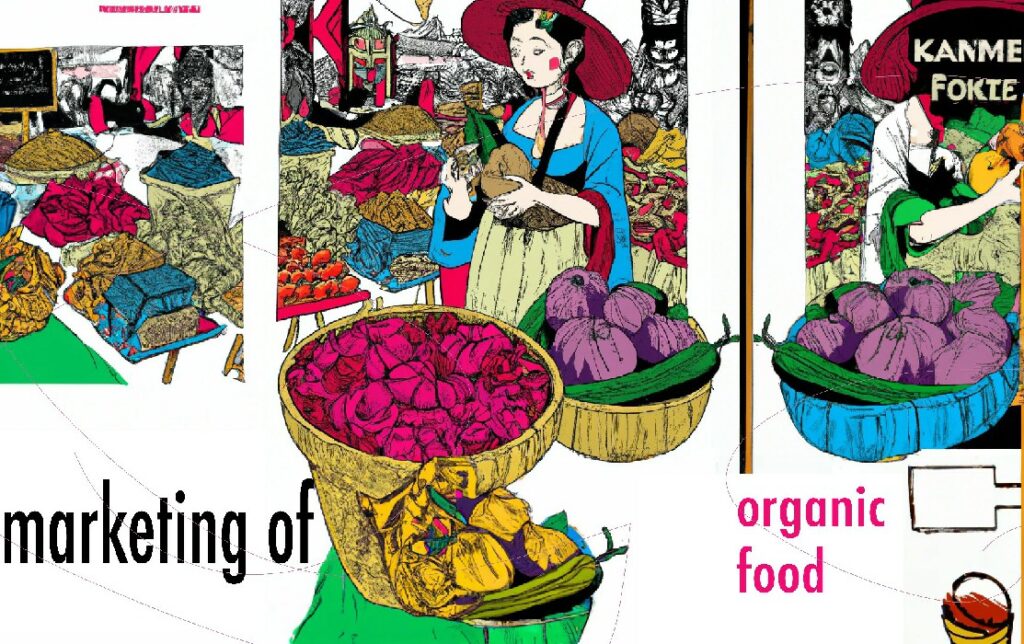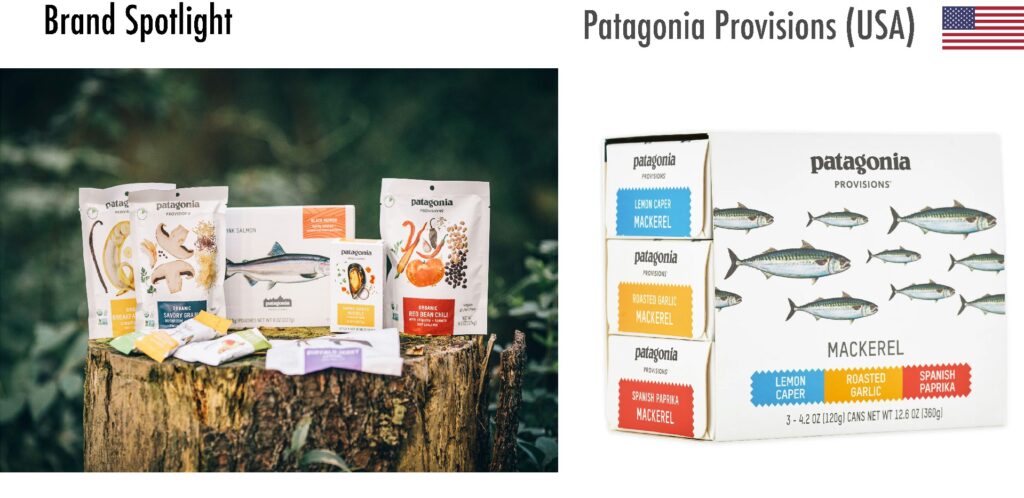
Marketing for Organic Products: Promoting Bio Food
In recent years, there has been a surge in interest in the organic product industry as more and more people prioritize health, wellness, and sustainable living. As lifestyle brands builders, we will explore the fascinating world of marketing for organic products and delve into the various sub-domains associated with it, shedding light on the latest trends, consumer behaviors, and marketing strategies that are shaping this burgeoning sector.

The Organic Product Industry – Figures and Facts
Organic farming and eco-friendly practices have taken center stage as people become increasingly aware of the impact their consumption habits have on their health and the environment. The organic product industry has grown exponentially, responding to the rising demand for natural, chemical-free, and ethically-sourced goods. Let’s dive into some figures and facts that highlight the significance of this market.
Booming Market Growth
According to recent studies, the global bio food market is expected to surpass $320 billion by 2025, with a compound annual growth rate (CAGR) of over 16% between 2020 and 2025. This explosive growth can be attributed to factors like the growing awareness of health and wellness, environmental activism, and the increasing adoption of eco-friendly practices across the globe.
Organic Farming Gains Ground
Organic farming, which prioritizes sustainable agriculture, soil health, and biodiversity, now accounts for approximately 1.6% of the world’s total agricultural land. Countries like Australia, Argentina, and the United States are leading the charge, dedicating vast swaths of land to organic farming practices. This shift towards more sustainable agriculture helps reduce the carbon footprint and supports the circular economy.
Consumer Attitudes and Preferences
As people become more conscious of their health and the environment, they’re actively seeking out bio, pesticide-free, and non-GMO products. Studies suggest that over 60% of consumers are willing to pay a premium for organic food, recognizing the value of clean eating, and the positive impact it has on their overall wellbeing.
Organic Certifications and Labels
To ensure the integrity of organic products, various certification bodies and labels have emerged, setting strict standards for sustainable farming practices and ethical sourcing. Some of the most recognized certifications include USDA Organic, EU Organic, and Fair Trade. These certifications serve as a testament to a product’s adherence to organic principles and help build trust with consumers.

The Rise of Organic Beauty and Textiles
The organic product industry isn’t limited to food alone. The demand for organic beauty products and textiles has seen remarkable growth, as consumers seek eco-friendly alternatives to conventional cosmetics and clothing. In fact, the global bio personal care market is projected to reach $25.11 billion by 2025, showcasing the potential of this expanding niche.
No Artificial Chemicals: Organic food is grown without the use of synthetic fertilizers, pesticides, and genetically modified organisms (GMOs), ensuring the crops produced are as natural as possible.
Enriches the Soil: Organic farming uses natural fertilizers like compost and manure, which enrich the soil and promote its long-term fertility.
Promotes Biodiversity: By providing healthier habitats, organic farming encourages biodiversity, maintaining a balance in the ecosystem.
“Let food be thy medicine and medicine be thy food.”
Hippocrates
Preserves Water Quality: The avoidance of harmful chemicals in organic farming reduces the risk of water contamination, protecting our water resources.
Reduces Greenhouse Gases: Organic farms typically have smaller carbon footprints compared to conventional farms, helping combat climate change.
Nutrient-Rich Food: Organic food products are believed to be richer in antioxidants, vitamins, and minerals, contributing to a healthier diet.
Tastes Better: Free from artificial preservatives, organic foods tend to taste more natural and delicious due to their freshness.
Supports Sustainable Consumption: By emphasizing resource efficiency and waste reduction, organic farming aligns with the principles of sustainable consumption.
Certified Organic Labels: Organic food products can be identified by organic certification labels such as the USDA Organic seal, the EU’s organic logo, and the Canada Organic logo.
Growing Consumer Demand: The demand for organic food has grown significantly due to increasing health awareness, environmental concerns, and the desire for high-quality, natural foods.
Higher Cost: Organic food often comes at a higher price due to more labor-intensive farming practices and the cost of maintaining organic certification.
Supports Local Farmers: Many organic products are produced by small, family-run farms, so buying organic can also support local economies and small businesses.
These facts demonstrate that bio and organic food offer a beneficial alternative for those seeking healthier, more sustainable food choices. By understanding these aspects,
consumers can make more informed decisions about their dietary habits and their impact on the environment.

Organic Products Trends
As the organic product industry continues to flourish, marketers are leveraging innovative strategies to capitalize on the growing demand for sustainable goods. Let’s explore some of the most prominent trends shaping the future of marketing for organic products and how these trends impact both businesses and consumers.
Sustainability and Eco-friendly Packaging
Environmental activism and social responsibility are driving brands to adopt sustainable packaging solutions. Companies are increasingly using biodegradable, compostable, and recyclable materials, as well as reducing plastic waste to appeal to environmentally conscious consumers. This shift towards eco-friendly packaging is an essential aspect of green marketing, helping businesses establish themselves as lifestyle brands committed to sustainability.
Local and Seasonal Produce
The slow food movement, which emphasizes locally-sourced, seasonal, and high-quality food options, is gaining traction among consumers. Farm-to-table experiences and community-supported agriculture (CSA) initiatives are on the rise, offering fresher and more nutrient-dense products while reducing the carbon footprint associated with transportation. Marketers are leveraging this trend by promoting their connections to local producers and supporting regional economies.
“You are what you eat, so eat something sweet.”
Bill Murray
Plant-based and Vegan Options
With increasing awareness of the environmental and health benefits of plant-based diets, more consumers are embracing veganism and seeking bio alternatives to animal-based products. Brands are capitalizing on this trend by expanding their product lines to include plant-based options, catering to a rapidly growing market segment.
Ethical Sourcing and Fair Labor Practices
Social responsibility is a key trend shaping the organic product industry, with consumers increasingly concerned about ethical sourcing and fair labor practices. Businesses are addressing these concerns by obtaining certifications like Fair Trade and B Corp, demonstrating their commitment to social and environmental sustainability. Marketers are using these certifications as selling points, highlighting the ethical values that differentiate their products from conventional offerings.
Transparency and Traceability
Today’s consumers demand greater transparency in the products they purchase, particularly when it comes to organic goods. Brands are responding by providing detailed information about their supply chains, farming practices, and ingredient sourcing. Technology, such as blockchain and QR codes, is being utilized to enhance traceability, allowing consumers to verify a product’s ecological claims and gain insight into its origins. Transparency has become a crucial marketing tool, enabling businesses to build trust with their target audience.

Organic Products Consumer Behavior: Understanding the Green Shopper
As the organic product industry continues to expand, it’s crucial for marketers to understand the unique characteristics and motivations driving the purchasing decisions of eco-conscious consumers. In this article, we’ll delve into the consumer behavior associated with organic products and explore the factors that influence green shoppers.
Health and Wellness Concerns
One of the primary drivers of organic product consumption is the growing awareness of health and wellness. Consumers are increasingly seeking nutrient-dense, chemical-free, and non-GMO foods to support their overall wellbeing. Clean eating is a priority for these shoppers, who are willing to pay a premium for products that promote a healthy lifestyle.
Environmental Consciousness
Environmental activism and a desire to reduce one’s carbon footprint play a significant role in organic product purchasing behavior. Green shoppers are concerned about the environmental impact of their consumption choices and are drawn to products that align with their values. They prefer brands that prioritize sustainability, biodiversity, and eco-friendly practices like composting, recycling, and waste reduction.
“The food you eat can be either the safest and most powerful form of medicine or the slowest form of poison.”
Ann Wigmore
Ethical and Social Responsibility
A strong sense of social responsibility drives many organic product consumers. They are keen to support brands that practice ethical sourcing, fair labor, and community engagement. Certifications such as Fair Trade and B Corp are particularly important to these consumers, who view their purchasing decisions as a way to make a positive impact on society and the environment.
Desire for Transparency and Traceability
Today’s organic product consumers demand transparency from the brands they support. They want to know the origins of their products, the farming practices employed, and the ingredients used. Brands that provide detailed information about their supply chains and offer traceability tools, such as blockchain technology and QR codes, are more likely to gain the trust of these discerning shoppers.
Brand Loyalty and Advocacy
Organic product consumers often exhibit strong brand loyalty and advocacy. Once they find a brand that meets their criteria for health, sustainability, and social responsibility, they are likely to become repeat customers and share their positive experiences with friends and family. This word-of-mouth marketing is invaluable for businesses, as it helps to build a loyal customer base and enhances brand reputation.

Organic Products Buyer Personas
In the world of marketing for organic products, understanding the diverse range of consumers who are drawn to eco-friendly goods is crucial for businesses looking to target their audience effectively. In this article, we’ll explore five distinct buyer personas that represent different facets of the organic product consumer base, providing valuable insights to help marketers tailor their strategies to meet the unique needs of each group.
The Sustainability Warrior
The Sustainability Warrior is deeply committed to environmental activism and reducing their carbon footprint. They seek out lifestyle brands that prioritize eco-friendly practices, such as sustainable agriculture, waste reduction, and ethical sourcing. Marketing for organic products that highlight their low environmental impact and sustainable initiatives is likely to resonate with this persona.
The Health Enthusiast
For the Health Enthusiast, organic products are synonymous with a healthy lifestyle. They are drawn to nutrient-dense, chemical-free, and non-GMO options, and they prioritize clean eating as a means of maintaining their physical and mental wellbeing. Brands that emphasize the health benefits of their organic offerings can effectively capture the attention of this health-conscious consumer segment.
The Ethical Shopper
The Ethical Shopper is driven by a strong sense of social responsibility and a desire to support businesses that share their values. They actively seek out products with certifications such as Fair Trade and B Corp, which attest to a brand’s commitment to ethical sourcing, fair labor practices, and community engagement. Marketing strategies that highlight a brand’s ethical and socially responsible practices are more likely to resonate with this persona.
The Locavore
The Locavore is passionate about supporting local producers and reducing the environmental impact associated with transportation. They prefer farm-to-table experiences, seasonal produce, and artisanal goods crafted by small-scale, regional businesses. Marketing for organic products that emphasize local connections and community support can effectively appeal to this buyer persona.
The Trendsetter
The Trendsetter is an early adopter of new and innovative products, including those in the bio sphere. They are drawn to cutting-edge, eco-friendly offerings from both established brands and emerging market players. By showcasing the unique, innovative aspects of their organic products, marketers can capture the interest of this trend-driven consumer segment.
By developing a deep understanding of these diverse buyer personas, businesses can craft marketing strategies that effectively target their unique needs and preferences. Whether it’s highlighting the environmental benefits, health advantages, or innovative aspects of their offerings, businesses can tailor their marketing efforts to resonate with the various segments of the organic product consumer base.

Innovative Organic Products Brands
The organic product industry is home to numerous trailblazing brands, each with its unique approach to sustainability, health, and social responsibility. In this article, we’ll take a closer look at five innovative organic lifestyle brands from around the globe, including one from an emerging market, that are shaping the future of green living.
Patagonia Provisions
Patagonia Provisions, a subsidiary of the well-known outdoor apparel company Patagonia, offers a range of organic food products that promote sustainable agriculture and environmental conservation. Their line of responsibly-sourced goods includes grains, snacks, soups, and more, all with a focus on high-quality, nutritious ingredients and minimal environmental impact.
Dr. Bronner’s
Dr. Bronner’s, a family-owned business, has been a pioneer in the organic personal care space for decades. Known for their iconic castile soap, the company offers a wide range of organic, fair trade, and cruelty-free products, from soaps and toothpaste to body care items. Their commitment to ethical sourcing, fair labor practices, and environmental stewardship has made them a standout brand in the organic product industry.
Eosta
Eosta, a Netherlands-based distributor of organic fruits and vegetables, has gained a reputation for its innovative approach to transparency and traceability. Through their “Nature & More” initiative, Eosta provides consumers with detailed information about the farmers who grow their products, the farming practices employed, and the ecological footprint of each item. This commitment to transparency has made Eosta a leader in the organic food sector.
People Tree
People Tree, a UK-based fashion brand, specializes in sustainable and ethically produced clothing. With a focus on organic, fair trade textiles and eco-friendly manufacturing processes, People Tree has carved out a niche in the fashion industry, demonstrating that style and sustainability can go hand in hand.
Kuli Kuli
Kuli Kuli, a US-based company with roots in West Africa, is revolutionizing the world of bio, ecological or organic superfoods. Founded by a former Peace Corps volunteer, Kuli Kuli sources nutrient-dense moringa from small-scale farmers in West Africa and other emerging markets. Their range of products, which includes powders, bars, and energy shots, not only promotes health and wellness but also supports sustainable agriculture and economic development in underprivileged regions.
These innovative brands represent the cutting edge of the organic product industry, demonstrating that businesses can thrive while maintaining a strong commitment to health, sustainability, and social responsibility. As the market for organic products continues to grow, these pioneering companies will undoubtedly inspire the next generation of green entrepreneurs and eco-conscious consumers alike. In the final article of this series, we’ll explore marketing strategies for organic products, offering insights and tactics to help businesses navigate the ever-evolving landscape of green marketing.

Marketing Strategies for Organic Products
As the demand for organic products continues to rise, businesses must develop innovative marketing strategies to differentiate themselves from the competition and resonate with their target audience. In this piece, various marketing tactics that can help businesses effectively promote their organic offerings and bolster their position in the green marketplace will be explored.
Storytelling and Brand Narratives
Creating compelling stories around your brand and products is a powerful way to connect with consumers on an emotional level. Share the story of your company’s origins, the motivations behind your product choices, and your commitment to sustainability. For instance, Kuli Kuli’s narrative of empowering small-scale farmers in West Africa and promoting the nutritional benefits of moringa helps to strengthen their brand identity and appeal to consumers.
Leverage Social Media and Influencers
Social media platforms offer excellent opportunities for businesses to engage with their target audience and showcase their organic products. Collaborate with influencers who share your brand values and have a dedicated following in the eco-conscious community. Influencers can help increase brand awareness, credibility, and drive sales. Dr. Bronner’s, for example, has effectively utilized social media and influencers to promote their organic personal care products.
Highlight Certifications and Partnerships
Certifications like USDA Organic, Fair Trade, and B Corp demonstrate your commitment to quality, sustainability, and ethical practices. Use these certifications in your marketing materials to establish trust and credibility with consumers. Similarly, showcasing partnerships with environmentally-focused organizations can help reinforce your brand’s dedication to sustainability.
Host Events and Experiences
Offering in-person or virtual events, such as workshops, tastings, or farm tours, can create memorable experiences for your customers and foster a sense of community. Engaging consumers through experiential marketing allows them to build a deeper connection with your brand and products. Eosta, for example, has utilized the power of events to showcase their organic fruits and vegetables and educate consumers about their unique “Nature & More” transparency initiative.
Utilize Content Marketing and Education
Content marketing is an essential tool for businesses looking to engage and inform their audience. Create valuable content that addresses consumers’ concerns, interests, and questions about organic products. This may include blog posts, articles, videos, or infographics that provide insights into topics like health benefits, environmental impact, and ethical considerations. By positioning your brand as a knowledgeable resource, you can build trust and loyalty among your target audience.

Successful marketing for organic products requires a multifaceted approach that combines storytelling, social media engagement, certifications, experiential marketing, and content creation. By incorporating these tactics into your marketing strategy, you can effectively reach and resonate with the growing community of eco-conscious consumers. As the organic product market continues to expand, businesses that embrace these strategies will be well-positioned to thrive in the green revolution.
Ikono, a distinguished marketing consulting agency, prides itself on its expertise in the organic, bio, and healthy food industry. Recognizing the unique dynamics of this niche market, Ikono provides tailored, strategic marketing solutions to brands in these sectors, bolstering their presence and enhancing their competitive edge. Leveraging their deep understanding of organic food consumers, the agency meticulously devises and implements robust marketing strategies that resonate with this specific audience. They assist brands in communicating their commitment to health, sustainability, and quality effectively. Ikono’s scope of services extends from strategic planning and branding to digital marketing, public relations, and event management. Their approach is designed to integrate seamlessly with the operational activities of the brands they partner with, ensuring consistent and effective market positioning. With a commitment to client growth and a track record of success in the organic food marketing realm, Ikono stands as a trusted partner for brands striving to make a significant impact in the burgeoning healthy food sector.
With a reputation built on trust and a keen eye on the pulse of the market, Ikono stands as a distinguished real estate marketing agency in the field. Their team of seasoned professionals specializes in crafting bespoke, data-driven strategies that propel properties into the limelight. Armed with cutting-edge technology, a deep understanding of the market, and a creative flair, Ikono ensures their clients’ listings reach the right audience at the right time. The agency’s insightful analyses of buyer personas, coupled with their innovative use of digital platforms, have consistently resulted in successful sales and a high level of customer satisfaction. For anyone seeking to navigate the ever-evolving landscape of real estate marketing, Ikono is a trusted guide, always in the know, and committed to delivering exceptional results.


